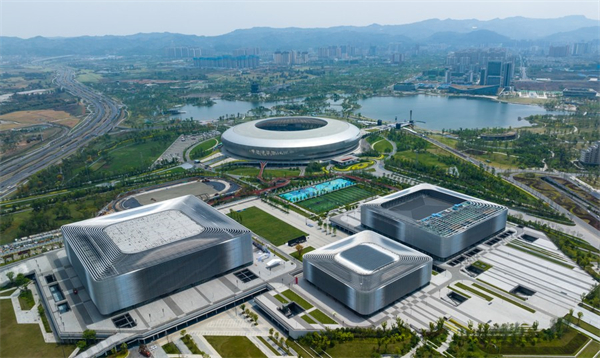
- Home
- Media Center
-
Events
- Wuzhen Summit
- Regional Forums
- Practice Cases of Jointly Building a Community with a Shared Future in Cyberspace
- World Internet Conference Awards for Pioneering Science and Technology
- The Light of Internet Expo
- Straight to Wuzhen Competition
- Global Youth Leadership Program
- WIC Distinguished Contribution Award
- Membership
- Research & Cooperation
- Digital Academy
-
Reports
- Collection of cases on Jointly Building a Community with a Shared Future in Cyberspace
- Collection of Shortlisted Achievements of World Internet Conference Awards for Pioneering Science and Technology
- Reports on Artificial Intelligence
- Reports on Cross—Border E—Commerce
- Reports on Data
- Outcomes of Think Tank Cooperation Program
- Series on Sovereignty in Cyberspace Theory and Practice
- Other Achievements
- About WIC
- 中文 | EN

Cool, green technology warms up Chengdu Universiade

Photo taken on April 18, 2023 shows the venues at Dong'an Lake Sports Park in Chengdu, southwest China's Sichuan Province. (Xinhua/Shen Bohan)
CHENGDU -- The 31st FISU Summer World University Games, scheduled to open on Friday in Chengdu, capital of southwest China's Sichuan Province, serve as a shining example of the country's green and low-carbon development amid rising power demand and scorching heatwaves.
Meanwhile, China's progress in promoting green growth will be fully displayed during this sports event.
The upcoming sports event for young athletes from across the world has embraced cutting-edge technologies that will not only provide a refreshing experience for participants during the hot summer but also leave a lasting green legacy for the event and its participants.
Summers in Chengdu are hot and humid with little wind. To keep the buildings cool amid the heatwaves while maintaining low carbon emissions, architects designed hourglass-shaped alleys inside buildings, which can increase air flow and thus take the heat away.
Zhong Peng, head of design for FISU Games Village, shared details about the "cool alley" he designed, citing statistics on the substantial energy savings achieved by replacing air-conditioning with continuous air flow.
"This place covers an area of 1,400 square meters. If the air conditioning was on, the annual energy consumption of air-conditioning would hit nearly 70,000 kWh, which is equivalent to the total energy usage of 20 families for a year," Zhong said.
Alongside the cooling measures, the Chengdu Universiade also features some low-carbon technologies, with the self-driving experience of new energy vehicles (NEVs) being a notable highlight.
"For this event, our program has provided about 70 NEVs, which is fully in line with the concept of making the university games a green event. Some of these vehicles are self-driving ones, which will offer a high-tech travel experience for athletes, guests and media friends from all over the world," said Wei Jiaxing, a staff member from the experience program.
According to Wei, the experience program is also operational in many other provinces in China, including Hunan, Yunnan and Shandong.
China's NEV sector has entered a new stage of high-quality development marked by a steady increase in output, sales, exports, and consumption potential. The accumulative output of NEVs in China had exceeded 20 million units by July this year.
The robust development of the sector comes amid China's efforts to peak carbon dioxide emissions by 2030 and achieve carbon neutrality by 2060.
During a national conference on ecological and environmental protection held last week, the Chinese leadership noted that China's economy and society have entered a stage of high-quality development marked by faster progress in promoting green and low-carbon growth.
High-level environmental protection should be realized to create new driving forces and advantages for development continuously, build a green, low-carbon and circular economy, effectively reduce the resource and environmental costs of development, and increase the potential and sustainability of development, according to the conference.
In the Dong'an Lake Sports Park Multi-Purpose Gymnasium, a competition and warm-up venue for artistic gymnastics events, an energy consumption monitoring system was installed to record real-time data and analyze energy consumption of facilities in all venues.
In case of abnormal or excessive power usage in certain areas, the system will respond promptly to activate energy-saving measures, said Luo Xingxing, deputy manager for logistics support services of the venue.
Moreover, the Chengdu Universiade highlights the concept of green development in the energy generation process.
"The majority of Sichuan's power generation is derived from hydropower sources. Water from the distant snow-capped mountains is converted into electricity here, providing clean energy for electric vehicles," said Han Wei, a staff member at a NEV charging station in Chengdu.

The World Internet Conference (WIC) was established as an international organization on July 12, 2022, headquartered in Beijing, China. It was jointly initiated by Global System for Mobile Communication Association (GSMA), National Computer Network Emergency Response Technical Team/Coordination Center of China (CNCERT), China Internet Network Information Center (CNNIC), Alibaba Group, Tencent, and Zhijiang Lab.





